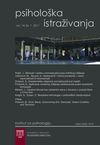Povezanost sklonosti ka riziku, profesionalnih preferencija i pristupa odabiru buduće profesije
The Relation of Risk-Taking Propensity, Professional Preferences and the Approach to the Selection of Future Profession
Author(s): Olga Marković Rosić, Svetlana Čizmić, Milica VukelićSubject(s): Education, Psychology, Vocational Education
Published by: Филозофски факултет, Универзитет у Београду
Keywords: risk-taking propensity; selection of future profession; Evaluation of Risk scale (EVAR); Test of Professional Orientation (TPO);
Summary/Abstract: Research has shown that risk-taking individuals choose professions that involve a high level of uncertainty, change or flexibility. The aim of this research was to study the relation between risk-taking propensity and professional preferences, as well as between different indicators of the approach to the selection of future profession and risk-taking propensity. The study was conducted on the sample of 583 students attending the final grade of secondary school. For the assessment of risk-taking propensity we used a modified version of the Evaluation of Risk scale (EVAR), while professional interests were investigated by the Test of Professional Orientation (TPO). In addition, we analysed certain indicators of the approach to the selection of profession that were interesting in the context of career counselling, namely: duration of the selection of profession, the number of professional preferences and readiness to make a professional choice. The results have shown that risk-taking propensity is significantly correlated with professional preferences where risk is an important job feature (such as professions in the field of security) as well as with the professions where risk is an important part of success (such as sports). It has also been shown that risk-taking individuals assess themselves as more ready to make decisions on their own professional choice. Based on the obtained results, it can be concluded that risk-taking propensity is an important characteristic that should be taken into account when studying professional preferences and the approach to the selection of future profession in adolescents.
Journal: Psihološka istraživanja
- Issue Year: 17/2014
- Issue No: 2
- Page Range: 121-135
- Page Count: 15
- Language: Serbian

